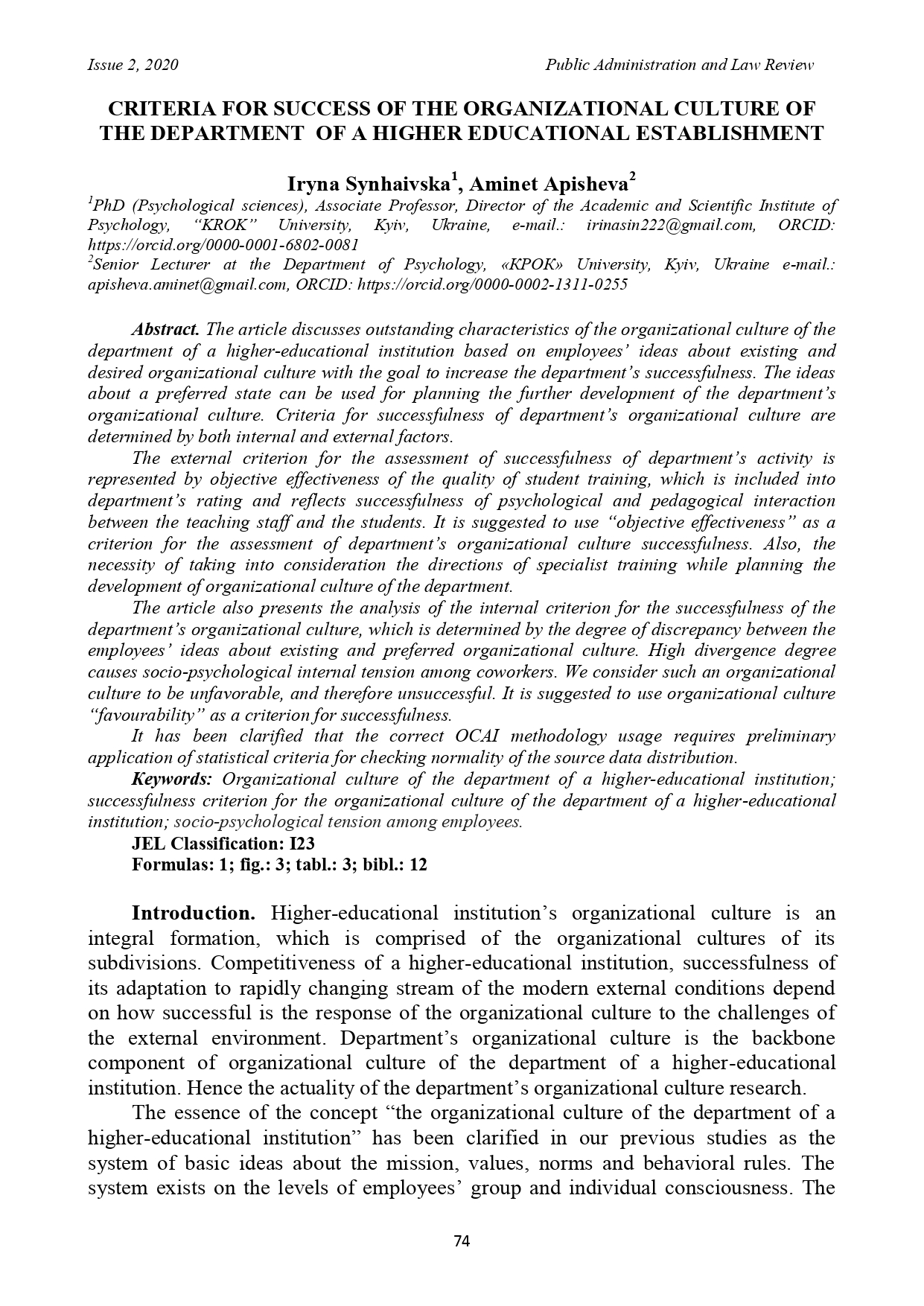CRITERIA FOR SUCCESS OF THE ORGANIZATIONAL CULTURE OF THE DEPARTMENT OF A HIGHER EDUCATIONAL ESTABLISHMENT
DOI:
https://doi.org/10.36690/2674-5216-2020-2-74Keywords:
organizational culture of the department of a higher-educational institution, successfulness criterion for the organizational culture of the department of a higher-educational institution, socio-psychological tension among employeesAbstract
The article discusses outstanding characteristics of the organizational culture of the department of a higher-educational institution based on employees’ ideas about existing and desired organizational culture with the goal to increase the department’s successfulness. The ideas about a preferred state can be used for planning the further development of the department’s organizational culture. Criteria for successfulness of department’s organizational culture are determined by both internal and external factors.
The external criterion for the assessment of successfulness of department’s activity is represented by objective effectiveness of the quality of student training, which is included into department’s rating and reflects successfulness of psychological and pedagogical interaction between the teaching staff and the students. It is suggested to use “objective effectiveness” as a criterion for the assessment of department’s organizational culture successfulness. Also, the necessity of taking into consideration the directions of specialist training while planning the development of organizational culture of the department.
The article also presents the analysis of the internal criterion for the successfulness of the department’s organizational culture, which is determined by the degree of discrepancy between the employees’ ideas about existing and preferred organizational culture. High divergence degree causes socio-psychological internal tension among coworkers. We consider such an organizational culture to be unfavorable, and therefore unsuccessful. It is suggested to use organizational culture “favourability” as a criterion for successfulness.
It has been clarified that the correct OCAI methodology usage requires preliminary application of statistical criteria for checking normality of the source data distribution.
Downloads
References
Alvesson, M. (2005), Orhanizatsijna kul'tura [Organizational culture], Humanitarnyj tsentr, Kharkiv, Ukraine.
Cameron, K. S., and Quinn, R. E. (1999), Diagnosing and Changing Organizational Culture: Based on the Competing Values Framework. Reading, MA: Addison –Wesley.
Herbert, D., L. von Rosenstiel (2002), Orhanyzatsyonnaia psykholohyia. Chelovek y orhanyzatsyia [Organizational Psychology. Man and Organization], Kohlhammer Verlag, Stuttgart, Germany.
Ivkin, V. (2014), “Educational organization staff’s attitudes to change and the problem of development of organizational culture types”, Aktual'ni problemy psykholohii №1, vol. 41, pp. 24–29.
Karamushka, L., Kredentser, O., Tereshchenko, K. et.al. (2015), Psykholohichni determinanty rozvytku orhanizatsijnoi kul'tury [Psychological determinants of organizational culture development], Pedahohichna dumka, Kiev, Ukraine.
Nakonechna, N. (2016), “Psychological conditions of the development of private educational institution corporate culture”. Ph. D. Thesis, organizational psychology: economical psychology, University KROK, Kiev.
Pryhozhyn, A. (2003), Metody razvytyia orhanyzatsyonnoj kul'tury [Organizational Culture Development Methods], MCFR, Kiev, Ukraine.
Schein E. (2010), Organizational Culture and Leadership (4th ed.). San Francisco, CA: Jossey-Bass Publisher.
Synhaivska, I. (2010), “Corporate culture as a means of psychological work with personnel”, Perspectiva academicа, pp. 154–159.
Synhaivska, І. (2015), “Psychological features of coordination of personal and social requirements to professional success of the university teacher”, Problemy suchasnoi psykholohii, vol 30, pp. 574–588.
The Verkhovna Rada of Ukraine (2014), The Law of Ukraine “On higher education”, available at http://zakon.rada.gov.ua/laws/show/en/1556-18
Vlasov, P. (2015), Psykholohyia orhanyzatsyj: proektyrovanye na etape zamysla [Organizational Psychology: Design at the Design Stage], Humanitarnyj tsentr, Kharkiv, Ukraine.

Downloads
Published
How to Cite
Issue
Section
License
Copyright (c) 2020 Scientific Center of Innovative Researches OÜ

This work is licensed under a Creative Commons Attribution 4.0 International License.





